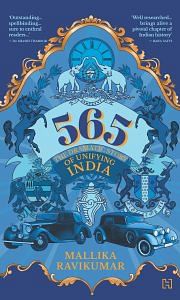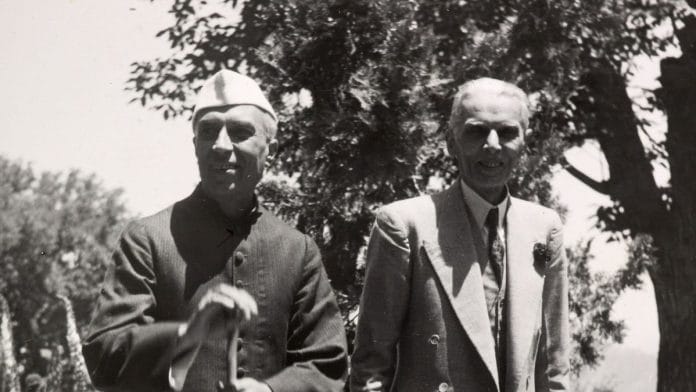Scribes, scribbling away furiously on their notepads, stopped to gape at the man on the podium. With his almond-shaped eyes, aquiline nose, delicate lips, unruly mop of thick, curly hair, phenomenal memory and oratorial flair, CP could well have been a fêted theatre artiste. But this performer had moulded himself for a far greater stage. Journalists from local dailies such as Malayala Manorama and Kerala Kaumudi to national newspapers like The Hindu and the Hindustan Times had turned up at the press conference expecting a momentous announcement, but this was beyond anything they had foreseen – Travancore was going to be an independent nation?
Murmurs rippled through the courtyard as CP paused for the full import of his words to sink in. The news would soon reach New Delhi, he mused, looking around at the reporters with satisfaction.
‘I ask the people of Travancore today’—CP raised his pitch as he gazed at the grand arches above him as though he was envisioning a dream—‘do you wish to cherish your freedom, or do you prefer to be submerged in anonymity in a divided India? His Highness, the maharaja, has decided that Travancore must remain independent, and I implore the people to stand by him in solidarity. Travancore is destined to be the saviour of south India.’
Years ago, CP had crossed paths with the Indian National Congress, and his commitment to the national cause had brought him into close contact with party stalwarts such as Annie Besant and Motilal Nehru. But those days were long gone. As things stood on that overcast day in June 1947, he harboured no love or reverence for the Congress triumvirate – not for Gandhi’s unconventional methods, not for Nehru’s socialistic leanings and, most certainly, not for Patel’s authoritative ways. And he had no intention whatsoever of gifting his prized kingdom to them.
‘From 15 August,’ the diwan said, holding up his forefinger, ‘no power on earth – short of open war, for which we are prepared – can prevent Travancore from asserting its independence. The path of necessity and the path of duty, the path of destiny and the path of glory’—he paused, as reporters jotted down his every word—‘is the path of independent Travancore.’
At Daggers Drawn
Springing up from his chair, Jawaharlal Nehru, his eyes tired and weary, flung the newspaper on the table in front of the viceroy. ‘CP has announced that Travancore will become an independent nation,’ he fumed, his face as red as the rose on his lapel. Viceroy Mountbatten turned to Nehru.
Dressed in his trademark cap, well-cut churidar-kurta and polished Peshawari sandals, the leader of the Congress appeared to have aged several years over the last month, vacillating between sudden displays of temper and long, moody silences. Having experienced one of Nehru’s outbursts first-hand in Simla only a few weeks ago, which had compelled him to rework the plan for the transfer of power, the viceroy braced himself for yet another explosion.
Seated to his left in a crisply tailored brown suit, a frail Muhammad Ali Jinnah, leader of the Muslim League, peered at the news article that had infuriated Nehru. Liaquat Ali Khan and Rab Nishtar, his colleagues from the League, exchanged telling glances.
‘Travancore has declared its independence,’ Nehru reiterated, this time with more vehemence. ‘This is impossible. If the other princely states follow suit, India will disintegrate into hundreds of pieces.’
‘Well…Travancore has every right to declare its independence,’ retorted Jinnah matter-of-factly, adjusting the monocle on his bony face.
Seated beside Nehru, with the bearing of a Caesar, Sardar Vallabhbhai Patel cast a grim sidelong glance at the Congress president, Acharya Kripalani. Weary of the constant bickering with Jinnah and his Muslim League, the Congress had finally agreed to Partition. But clearly more thorns lay strewn on the long road to freedom.
‘Absolutely,’ concurred Sir Conrad Corfield, head of the political department that oversaw the princely states, as he drew forward his copy of the Cabinet Mission Plan. ‘According to the terms here,’ he indicated the document, ‘the void resulting from the withdrawal of the British from India will have to be filled either by entering into a relationship with the successor governments, or by forming particular political arrangements as they, the states, deem fit.’
‘That does not mean the possibility of their remaining independent,’ thundered Nehru, throwing up his arms.
‘What else could “particular political arrangements” imply?’ demanded Corfi eld, tapping the words in the memorandum with his pencil.
‘I agree,’ Jinnah shrugged again. ‘Surely, after the lapse of British paramountcy, every princely state is sovereign and can do as it pleases.’
‘I do not see matters as you do,’ Nehru countered Jinnah, making no attempt to hide his dislike for the head of the Muslim League. Just a week earlier, Jinnah had quibbled over yet another clause, arguing that agreement to a proposal did not necessarily mean acceptance of the proposal. Jinnah and his histrionics exasperated Nehru. ‘As a lawyer, my views differ entirely on the interpretation of the phrase “particular political arrangements”.’
‘I speak as a lawyer too,’ Jinnah shot back in his heavily accented English, heartily reciprocating the mutual dislike. ‘Every state has the right to choose,’ he insisted, ‘to either join India or Pakistan, or remain free. And CP has made his state’s position quite clear. In fact,’ Jinnah pressed on, ‘Travancore has even appointed its representative in Pakistan.’
‘How extraordinary!’ Nehru huffed, turning to the viceroy in dismay. ‘There is no Pakistan as we speak. I wasn’t aware envoys were now being sent off to non-existent countries.’
Turning to his chief adviser, General Hastings Lionel ‘Pug’ Ismay, the viceroy heaved a sigh. As if presiding over the dissolution of the empire of his great-grandmother, Queen Victoria, were not demanding enough, he was often tasked with having to officiate at meetings where grown men squabbled like schoolboys.
 This excerpt from Mallika Ravikumar’s ‘565: The Dramatic Story of Unifying India’, has been published with permission from Hachette India.
This excerpt from Mallika Ravikumar’s ‘565: The Dramatic Story of Unifying India’, has been published with permission from Hachette India.







Immaturity seems to run in the male line of the family.